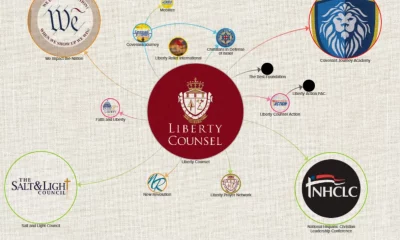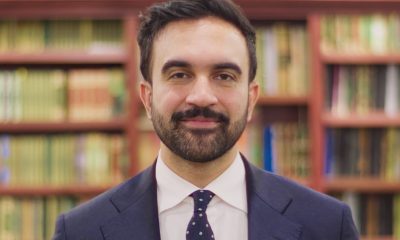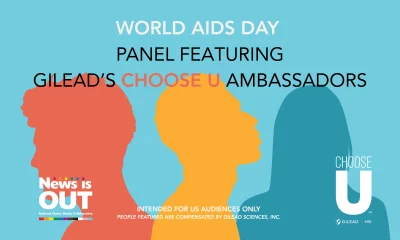Commentary
Is Israel ‘gay heaven?’ It’s complicated
American LGBT delegation visits Middle East
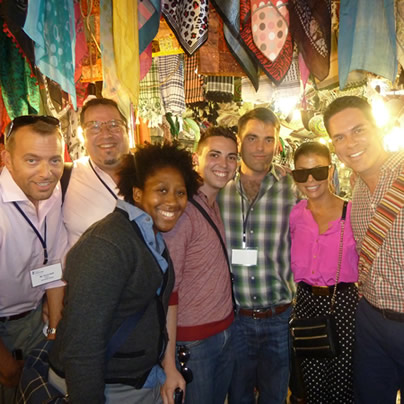
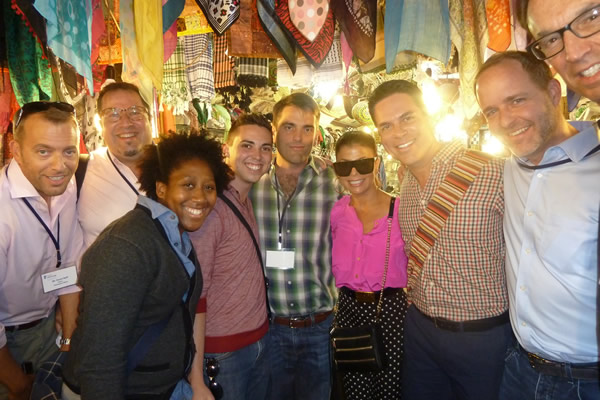
Project Interchange participants ran into Paula Abdul in the Jerusalem market. From left-right: Kevin Naff, Andy Sacher, Tamika Butler, John Campbell, Brad Sears, Paula Abdul, Jorge Valencia, Kirk Fordham and Malcolm Lazin. (Photo courtesy Project Interchange)
When a delegation of nine LGBT leaders from the United States arrived last month in Israel for an intensive seminar, we knew the gay residents of progressive Tel Aviv enjoyed broad acceptance and myriad legal protections. But imagine our surprise when TV personality Gal Uchovsky announced that we had arrived in “gay heaven.”
Israel is “the best LGBT country in the world,” he told us, adding that the nation’s LGBT residents face no serious problems that he could identify. A gay child growing up in rural Israel is better off than a similar kid in the rural United States, he observed. Homelessness is rare here and Israeli parents embrace their gay kids because, well, better to be gay than dead.
Uchovsky is a proud cheerleader for his country, which is endearing, though his privileged worldview has perhaps shielded him from some unpleasant, inconvenient realities. Life for LGBT Israelis is, indeed, more complicated than Uchovsky’s rosy assessment and, thus, our trip’s catchphrase was cemented: “It’s complicated.”
The stellar seminar, sponsored by Project Interchange, a program of the American Jewish Committee, brought me well out of my comfort zone and right into Ramallah and to the edge of the Gaza Strip. The focus of the visit — LGBT issues — was often overshadowed by the frustrating stalemate of the Palestinian-Israeli conflict. Why can’t the two sides come to an agreement on a two-state solution? It’s complicated. And, as we learned, it’s far more complicated than American mainstream media seem to grasp.
And so from the West Bank to Jerusalem to Tel Aviv to the Negev, the nine of us trekked to learn all we could from a diverse range of perspectives, including from Palestinians and Israeli experts critical of the country’s record on LGBT rights. The other eight participants in the weeklong seminar were: Log Cabin Republicans Executive Director Gregory T. Angelo; Tamika Butler of Young Invincibles; gay Harrisburg (Pa.) Treasurer John Campbell; Gill Action Fund Executive Director Kirk Fordham; Equality Forum Executive Director Malcolm Lazin; Lavender Effect Executive Director Andy Sacher; Williams Institute Executive Director Brad Sears; and Point Foundation CEO Jorge Valencia.
We toured Tel Aviv’s bustling, posh community center, touted as the only such center in the world that is municipally owned. The government’s funding of such centers and related LGBT causes is a mixed bag. In the United States, small LGBT non-profits and HIV service providers jockey for limited public grants, often leading to turf wars. But most such U.S. groups aren’t beholden to the government or muzzled by fears of government retaliation. It’s not clear that the same is true in Israel. It’s a dilemma: accept public money to advance your important work and mute your criticisms of the government or reject public funds and risk financial shortfalls that will curb programming. As one speaker put it, “I’d rather our public money went to gay causes than to building another bomb.”
The highlight of that visit for me was hearing from Uzi Even, the first openly gay member of the Knesset and a pioneering elder statesman of the Israeli LGBT rights movement who has helped rid the military of discriminatory policies and liberalize adoption laws. In a true sign of the times, his latest cause involves sorting out Israel’s divorce laws as they relate to same-sex couples.
My advice to Israeli LGBT advocates: Take time now to celebrate and honor the contributions of Even and others like him. Record his personal history and share it with young people. It wasn’t so long ago in Israel when gay sex acts were illegal. Such lightning-speed progress doesn’t happen by accident and brave pioneers like Even deserve our gratitude.
As we made our way up the stairs to meet with Even in the community center, we could hear the giggles of young children and stepped over a pile of neatly arranged kids sneakers in a hallway. Another sign of the times.
Several speakers emphasized the role that a 2009 shooting played in advancing gay acceptance. On Aug. 1, 2009, a gunman burst into the LGBT community center in Tel Aviv and opened fire, killing two and injuring at least 15 others. It’s hard to quantify how significant a role that tragedy played in changing Israeli attitudes toward gays, but our speakers agreed it was a turning point.
It’s a stark contrast to what we see in the United States, where violent hate crimes continue to plague our community, from trans women routinely killed in our inner cities to the recent murder of a gay man in the heart of New York’s gay village. Americans are so inured to violence that these crimes barely register in the mainstream media, let alone lead to a widespread change in attitudes.
After a couple of days in progressive Tel Aviv, we made our way to Jerusalem. In addition to the usual religious sites, a group of us visited the Jerusalem Open House, an LGBT community center engaged in broad grassroots work in the face of complicated problems like funding, space constraints, religious critics who have sometimes turned violent and the ever-present challenge of building relations with Arab residents of the city.
Celebrating gay pride in Jerusalem has been complicated, too. They don’t agree on much, but anti-gay animus was something that united the world’s major religions as conservative Jewish and Arab leaders denounced plans for pride parades in the holy city in recent years. In 2005, marchers were attacked by an ultra-orthodox Jewish man who stabbed three participants. The following year, Jerusalem was selected to host WorldPride, which led to more unrest and violent protests. Some lawmakers in the Knesset attempted to ban gay pride parades in Jerusalem, but those efforts fizzled. Our hosts in Jerusalem insist that relations are improving and that Pride is safer than in the recent past. Here, another stark contrast to the way we celebrate in the United States, with our corporate-sponsored pride villages, beer gardens and all-night parties.
From Jerusalem, we took a daytrip and toured Efrat, a small city in the Gush Etzion settlement bloc with its mayor, Oded Ravivi. The issue of settlements commands a lot of attention in U.S. media coverage of Israel and so I was curious and excited to see one up close. Efrat has eschewed the barbed wire fences that snake through so much of the Israeli landscape and officials have worked to cultivate economic ties with surrounding Palestinian villages. But we learned that such efforts only go so far. When the mayor approached a Palestinian schoolmaster about sending teachers to Efrat to teach Arabic to Israeli kids, he declined, fearing he would be “slaughtered” for collaborating with the Jews.
It was a sobering reminder of how moderates on both sides of the divide are thwarted by the extremists in their midst. Is there a cautionary lesson here for Americans, as our own political rhetoric becomes increasingly dominated by the most extreme, shrill voices of the far left and right; our legislators afraid to compromise and be seen as collaborating with the opposition?
In one awkward moment, a member of our group asked Mayor Ravivi how he would react if one of his children came out to him as gay. He seemed startled by the question and suggested it couldn’t happen in his family. Cue the eye rolling among some of us. Such reactions are common among many who proclaim they don’t discriminate but haven’t devoted much thought to the underlying issues. Gay kids are good for conservative politicians — just ask Dick Cheney.
After absorbing the complicated problems and history of Jerusalem, some of us needed a release and our gracious hosts at Open House took us to the lone gay bar in Jerusalem, called Video, where we had a few drinks and danced till the wee hours alongside a diverse crowd of revelers. Music, indeed, makes the people come together.
Accusations of ‘pinkwashing’
The concept of “pinkwashing” emerged as a hot topic throughout the week. Some critics claim the country’s embrace of LGBT rights is merely a propaganda effort to claim the mantle of modernity and establish a stark contrast to homophobic regimes in the West Bank, Gaza and elsewhere in the Middle East. These critics claim the government’s support for gay rights doesn’t threaten or undermine the structure of Israel and amounts to a “fig leaf,” and an attempt at distracting attention from the difficult problems of finding peace with the Palestinians.
I’m not convinced. Politics is about the art of the possible, not the ideal and certainly not the perfect. Sometimes we have to accept imperfect solutions or motives in the interest of securing protections for people in need. What’s most striking about Israel’s LGBT record isn’t what it has achieved legislatively or through court rulings, but the fact that all this progress is happening in the heart of the Middle East. Our group trip featuring nine outspoken American LGBT advocates is simply not possible anywhere else in the region. Even compared to the progress we’ve seen recently in the United States, Israel stands out because it is such a young country enacting these reforms. Americans are notoriously forward thinking and, as a result, we tend to forget our history. It was less than 10 years ago when President George W. Bush called for a federal constitutional amendment banning same-sex marriage and scores of states enacted their own constitutional bans. The architect of this shameful attack on LGBT rights was Ken Mehlman, a closeted gay man and modern-day Roy Cohn who has since come out as gay and now raises money for marriage equality campaigns. The change afoot is new and fast but fragile. Would America be seeing such dramatic change now if Mitt Romney had won last year’s election?
Meanwhile, Israel opened its military to out gays and lesbians and transgender service members — something still barred by the U.S. military. There is relationship recognition, if not full marriage equality. The government directly funds and supports the LGBT movement, for better or worse. And it doesn’t hide that support, but promotes it.
Still, some see nefarious motives.
Upon returning home from this trip, I received a letter criticizing the visit from a group called New York City Queers Against Israeli Apartheid. It read, in part:
“The delegation met with some unspecified ‘Palestinian officials in Ramallah,’ which strikes us as nothing but a token gesture. Worse, ‘pinkwashing’ — the attempt to use Israel’s supposedly decent record on gay rights to whitewash Israeli occupation and apartheid — has been front and center in international LGBT organizing over the past several years, particularly in the US. Any delegation of LGBT ‘leaders’ to Israel that doesn’t address it is clearly intended to contribute to pinkwashing.”
Our group was sensitive to pinkwashing from the outset and several of us requested meetings with gay Palestinians and their representatives. Project Interchange worked hard to provide a balanced view of the issues and invited two Palestinian LGBT groups — alQaws and Aswat — to meet with us. Officials at the Tel Aviv and Jerusalem LGBT centers were also asked if they could assist in persuading those groups to meet our delegation or knew of other Palestinian LGBT representatives who would be willing to meet us. Sadly, the groups refused to meet with us. Change is simply not possible without dialogue and I deeply regret this lost opportunity the Palestinians had to engage with an open-minded group of visitors seeking nothing more than understanding and education.
(I invited NYCQAIP to respond to this story and they accepted. I look forward to publishing their reaction and thoughts on pinkwashing in the coming days.)
In Ramallah, we were scheduled to meet with Dr. Saeb Erekat, the chief Palestinian negotiator. He cancelled his appearance and we learned why the next day: He had just submitted his resignation to Palestinian President Mahmoud Abbas over frustration with the pace of negotiations. Abbas rejected Erekat’s resignation but it’s clear that the current talks, which began four months ago with a John Kerry-instigated deadline of nine months, are not going well. Given the sorry record of our involvement in decades of failed talks, perhaps it’s time for the United States to step aside and allow another party a chance at diplomacy.
In Erekat’s place, we met with Abu Zayyad, a scholar and Fatah and PLO adviser. It seemed somewhat silly to ask him about the state of LGBT affairs given all the day-to-day challenges facing Palestinians in the West Bank. But he insisted that there is a level of gay acceptance, even if such views differ widely among family members, noting there are no laws in Ramallah related to gay issues and that there are at least two non-governmental organizations that espouse gay rights. He spent most of his lecture discussing the state of life for Palestinians and much of what he said was not encouraging. He lamented the lack of mobility for Palestinians, who don’t have passports, making international travel difficult at best. Locally, the checkpoints that Ramallah residents must navigate just to visit nearby Jerusalem create daily headaches. Zayyad, who said he spent three months in prison for participating in an anti-Israel protest, fears that a two-state solution will be impossible five years from now, when an estimated one million Israelis could be living in West Bank settlements.
“It will explode again,” he warned.
It’s often been said that Israel is a land of contradictions and that assessment came into sharp focus during our visit. Israel celebrates its status as the only Democracy in the Middle East, while its non-Jewish residents live under a flag adorned with religious iconography. In a nation so steeped in history, Israel is just 65 years old and is surprisingly lacking in many traditions. Located in the heart of the Middle East, where homosexuality can be punished by jail time or even death as in Iran, Israel has emerged as one of the world’s most pro-LGBT nations. A country that is more than 60 percent desert has perfected drip irrigation and desalinated water from the Mediterranean to solve a decades-old water crisis. And in a nation with such ancient religious influences, a large chunk of the population — estimated by one speaker as high as 50 percent — identifies as secular or atheist.
It’s impossible to summarize our weeklong adventure in a couple thousand words. A sincere and heartfelt thank-you to the team at Project Interchange, all of our speakers and to the people of Israel for their hospitality. In addition to the aforementioned experiences, we met with law professor Aeyal Gross, entrepreneur Hamutal Meridor, Times of Israel editor David Horovitz, Jerusalem Post reporter Khaled Abu Toameh, former Knesset member Einat Wilif, film director Eytan Fox and many others. We were serenaded by Ivri Lider; walked the Stations of the Cross; toured Yad Vashem, the Western Wall tunnels, the Mahaneh Yehuda Market and indulged in far too much of Israel’s impressive cuisine. We visited Sderot, Mitzpe Ramon and slathered ourselves in mud before floating in the Dead Sea.
It was in that moment — nine of us standing half naked, covered in mud — that I perceived a lasting bond forming among us. Despite our differing views on policy back home and occasional misunderstandings, we’d been through something emotional, powerful and unique together. An experience impossible to explain or summarize here, because, well, it’s complicated.
Kevin Naff is editor of the Washington Blade. Reach him at [email protected].

Today, on World AIDS Day, we honor the resilience, courage, and dignity of people living with HIV everywhere especially refugees, asylum seekers, and queer displaced communities across East Africa and the world.
For many, living with HIV is not just a health journey it is a journey of navigating stigma, borders, laws, discrimination, and survival.
Yet even in the face of displacement, uncertainty, and exclusion, queer people living with HIV continue to rise, thrive, advocate, and build community against all odds.
To every displaced person living with HIV:
• Your strength inspires us.
• Your story matters.
• You are worthy of safety, compassion, and the full right to health.
• You deserve a world where borders do not determine access to treatment, where identity does not determine dignity, and where your existence is celebrated not criminalized.
Let today be a reminder that:
• HIV is not a crime.
• Queer identity is not a crime.
• Seeking safety is not a crime.
• Stigma has no place in our communities.
• Access to treatment, care, and protection is a human right.
As we reflect, we must recommit ourselves to building systems that protect not punish displaced queer people living with HIV. We must amplify their voices, invest in inclusive healthcare, and fight the inequalities that fuel vulnerability.
Hope is stronger when we build it together.
Let’s continue to uplift, empower, and walk alongside those whose journeys are too often unheard.
Today we remember.
Today we stand together.
Today we renew hope.
Abraham Junior lives in the Gorom Refugee Settlement in South Sudan.
Commentary
Perfection is a lie and vulnerability is the new strength
Rebuilding life and business after profound struggles
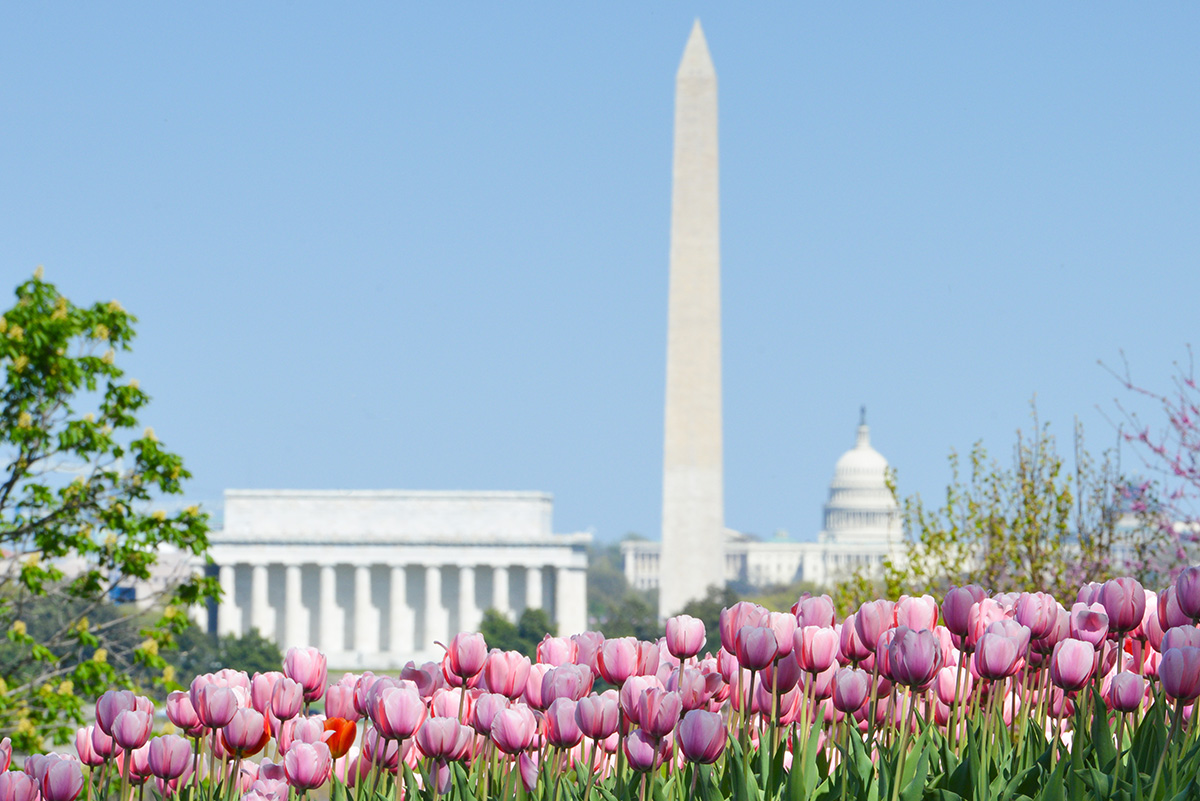
I grew up an overweight, gay Black boy in West Baltimore, so I know what it feels like not to fit into a world that was not really made for you. When I was 18, my mother passed from congestive heart failure, and fitness became a sanctuary for my mental health rather than just a place to build my body. That is the line I open most speeches with when people ask who I am and why I started SWEAT DC.
The truth is that little boy never really left me.
Even now, at 42 years old, standing 6 feet 3 inches and 225 pounds as a fitness business owner, I still carry the fears, judgments, and insecurities of that broken kid. Many of us do. We grow into new seasons of life, but the messages we absorbed when we were young linger and shape the stories we tell ourselves. My lack of confidence growing up pushed me to chase perfection as I aged. So, of course, I ended up in Washington, D.C., which I lovingly call the most perfection obsessed city in the world.
Chances are that if you are reading this, you feel some of that too.
D.C. is a place where your resume walks through the door before you do, where degrees, salaries, and the perfect body feel like unspoken expectations. In the age of social media, the pressure is even louder. We are all scrolling through each other’s highlight reels, comparing our behind the scenes to someone else’s curated moment. And I am not above it. I have posted the perfect photo with the inspirational “God did it again” caption when I am feeling great and then gone completely quiet when life feels heavy. I am guilty of loving being the strong friend while hating to admit that sometimes I am the friend who needs support.
We are all caught in a system that teaches us perfection or nothing at all. But what I know for sure now is this: Perfection is a lie and vulnerability is the new strength.
When I first stepped into leadership, trying to be the perfect CEO, I found Brené Brown’s book, “Daring Greatly” and immediately grabbed onto the idea that vulnerability is strength. I wanted to create a community at SWEAT where people felt safe enough to be real. Staff, members, partners, everyone. “Welcome Home” became our motto for a reason. Our mission is to create a world where everyone feels confident in their skin.
But in my effort to build that world for others, I forgot to build it for myself.
Since launching SWEAT as a pop up fundraiser in 2015, opening our first brick and mortar in 2017, surviving COVID, reemerging and scaling, and now preparing to open our fifth location in Shaw in February 2026, life has been full. Along the way, I went from having a tight trainer six pack to gaining nearly 50 pounds as a stressed out entrepreneur. I lost my father. I underwent hip replacement surgery. I left a relationship that looked fine on paper but was not right. I took on extra jobs to keep the business alive. I battled alcoholism. I faced depression and loneliness. There are more stories than I can fit in one piece.
But the hardest battle was the one in my head. I judged myself for not having the body I once had. I asked myself how I could lead a fitness company if I was not in perfect shape. I asked myself how I could be a gay man in this city and not look the way I used to.
Then came the healing.
A fraternity brother said to me on the phone, “G, you have to forgive yourself.” It stopped me in my tracks. I had never considered forgiving myself. I only knew how to push harder, chase more, and hide the cracks. When we hung up, I cried. That moment opened something in me. I realized I had not neglected my body. I had held my life and my business together the best way I knew how through unimaginable seasons.
I stopped shaming myself for not looking like my past. I started honoring the new ways I had proven I was strong.
So here is what I want to offer anyone who is in that dark space now. Give yourself the same grace you give everyone else. Love yourself through every phase, not just the shiny ones. Recognize growth even when growth simply means you are still here.
When I created SWEAT, I hoped to build a home where people felt worthy just as they are, mostly because I needed that home too. My mission now is to carry that message beyond our walls and into the city I love. To build a STRONGER DC.
Because strength is not perfection. Strength is learning to love an imperfect you.
With love and gratitude, Coach G.
Gerard Burley, also known as Coach G, is a D.C.-based fitness entrepreneur.
Commentary
Elusive safety: what new global data reveals about gender, violence, and erasure
Movements against gender equality, lack of human rights data contributing factors.
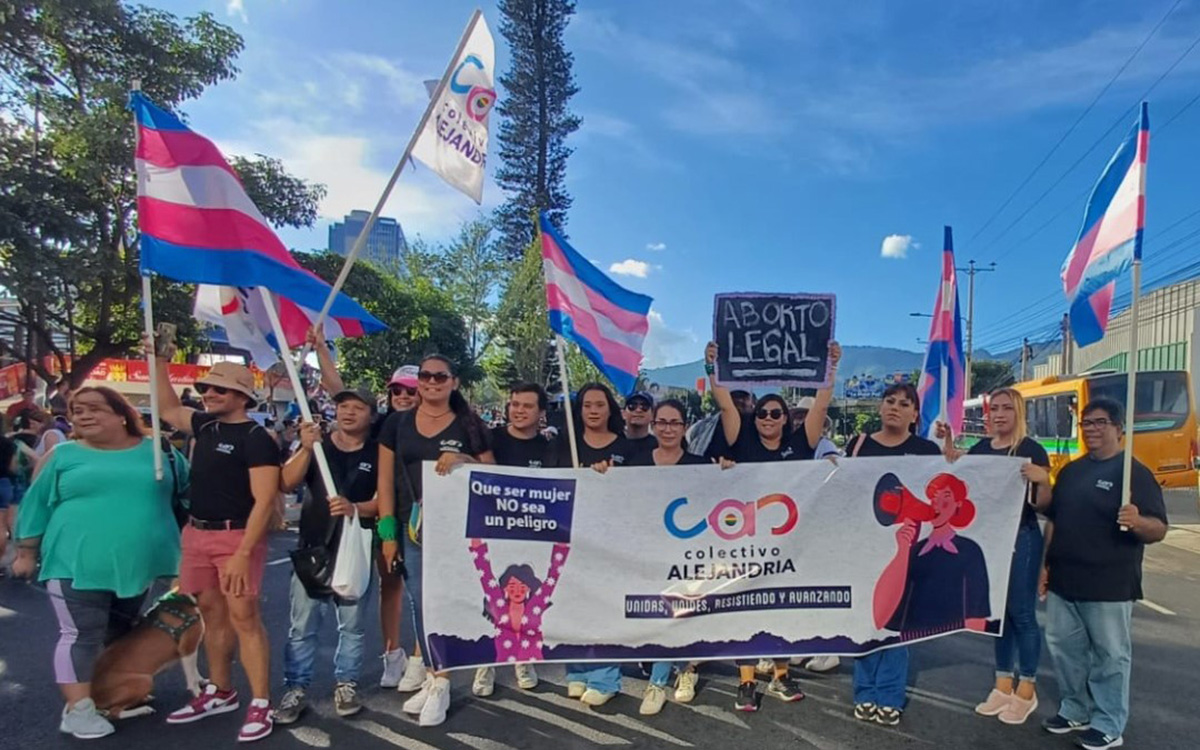
“My identity could be revealed, people can say whatever they want [online] without consequences. [Hormone replacement therapy] is illegal here so I’m just waiting to find a way to get out of here.”
-Anonymous respondent to the 2024 F&M Global Barometers LGBTQI+ Perception Index from Iraq, self-identified as a transgender woman and lesbian
As the campaign for 16 Days Against Gender-Based Violence begins, it is a reminder that gender-based violence (GBV) — both on– and offline — not only impacts women and girls but everyone who has been harmed or abused because of their gender or perceived gender. New research from the Franklin & Marshall (F&M) Global Barometers and its report A Growing Backlash: Quantifying the Experiences of LGBTQI+ People, 2022-2024 starkly show trends of declining safety among LGBTQI+ persons around the world.
This erosion of safety is accelerated by movements against gender equality and the disappearance of credible human rights data and reporting. The fight against GBV means understanding all people’s lived realities, including those of LGBTQI+ people, alongside the rights we continue to fight for.
We partnered together while at USAID and Franklin & Marshall College to expand the research and evidence base to better understand GBV against LGBTQI+ persons through the F&M Global Barometers. The collection of barometers tracks the legal rights and lived experiences of LGBTQI+ persons from 204 countries and territories from 2011 to the present. With more than a decade of data, it allows us to see how rights have progressed and receded as well as the gaps between legal protections and lived experiences of discrimination and violence.
This year’s data reveals alarming trends that highlight how fear and violence are, at its root, gendered phenomena that affect anyone who transgresses traditional gender norms.
LGBTQI+ people feel less safe
Nearly two-thirds of countries experienced a decline in their score on the F&M Global Barometers LGBTQI+ Perception Index (GBPI) from 2022-2024. This represents a five percent drop in global safety scores in just two years. With almost 70 percent of countries receiving an “F” grade on the GBPI, this suggests a global crisis in actual human rights protections for LGBTQI+ people.
Backsliding on LGBTQI+ human rights is happening everywhere, even in politically stable, established democracies with human rights protections for LGBTQI+ people. Countries in Western Europe and the Americas experienced the greatest negative GBPI score changes globally, 74 and 67 percent, respectively. Transgender people globally reported the highest likelihood of violence, while trans women and intersex people reported the highest levels of feeling very unsafe or unsafe simply because of who they are.
Taboo of gender equality
Before this current administration dismantled USAID, I helped create an LGBTQI+ inclusive whole-of-government strategy to prevent and respond to GBV that highlighted the unique forms of GBV against LGBTQI+ persons. This included so-called ‘corrective’ rape related to actual or perceived sexual orientation, gender identity, or expression” and so-called ‘conversion’ therapy practices that seek to change or suppress a person’s gender identity or expression, sexual orientation, or sex characteristics. These efforts helped connect the dots in understanding that LGBTQI+ violence is rooted in the same systems of inequality and power imbalances as the broader spectrum of GBV against women and girls.
Losing data and accountability
Data that helps better understand GBV against LGBTQI+ persons is also disappearing. Again, the dismantling of USAID meant a treasure trove of research and reports on LGBTQI+ rights have been lost. Earlier this year, the US Department of State removed LGBTQI+ reporting from its annual Human Rights Reports. These played a critical role in providing credible sources for civil society, researchers, and policymakers to track abuses and advocate for change.
If violence isn’t documented, it’s easier for governments to deny it even exists and harder for us to hold governments accountable. Yet when systems of accountability work, governments and civil society can utilize data in international forums like the UN Universal Periodic Review, the Convention on the Elimination of All Forms of Discrimination Against Women, and the Sustainable Development Goals to assess progress and compliance and call for governments to improve protections.
All may not be lost if other countries and donors fill the void by supporting independent data collection and reporting efforts like the F&M Global Barometers and other academic and civil society monitoring. Such efforts are essential to the fight against GBV: The data helps show that the path toward safety, equality, and justice is within our reach if we’re unafraid of truth and visibility of those most marginalized and impacted.
Jay Gilliam (he/him/his) was the Senior LGBTQI+ Coordinator at USAID and is a member of the Global Outreach Advisory Council of the F&M Global Barometers.
Susan Dicklitch-Nelson (she/her/hers) is the founder of the F&M Global Barometers and Professor of Government at Franklin & Marshall College.



